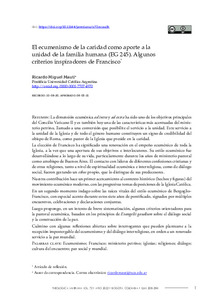Please use this identifier to cite or link to this item:
https://repositorio.uca.edu.ar/handle/123456789/15596| Título: | El ecumenismo de la caridad como aporte a la unidad de la familia humana (EG 245) : algunos criterios inspiradores de Francisco The Ecumenism of Charity as a Contribution to the Unity of the Human Family (EG 245) : some Inspiring Criteria of Francis |
Autor: | Mauti, Ricardo Miguel | Palabras clave: | ECUMENISMO; Francisco, Papa; IGLESIA; RELIGION; CULTURA DE ENCUENTRO; PAZ | Fecha de publicación: | 2022 | Editorial: | Pontificia Universidad Javeriana, Facultad de Teología | Cita: | Mauti, R. M. El ecumenismo de la caridad como aporte a la unidad de la familia humana (EG 245) : algunos criterios inspiradores de Francisco [en línea]. Teológica Javeriana. 2022, 72. doi: 10.11144/javeriana.tx72.ecaufh. Disponible en: https://repositorio.uca.edu.ar/handle/123456789/15596 | Resumen: | Resumen: La dimensión ecuménica ad intra y ad extra ha sido uno de los objetivos principales
del Concilio Vaticano II y es también hoy una de las características más acentuadas del ministerio
petrino, llamado a una conversión que posibilite el servicio a la unidad. Este servicio a
la unidad de la Iglesia y de todo el género humano constituyen un signo de credibilidad del
obispo de Roma, como pastor de la Iglesia que preside en la caridad.
La elección de Francisco ha significado una renovación en el empeño ecuménico de toda la
Iglesia, a la vez que una apertura de sus objetivos e interlocutores. Su estilo ecuménico fue
desarrollándose a lo largo de su vida, particularmente durante los años de ministerio pastoral
como arzobispo de Buenos Aires. El contacto con líderes de diferentes confesiones cristianas y
de otras religiones, tanto a nivel de espiritualidad ecuménica e interreligiosa, como de diálogo
social, fueron gestando un ethos propio, que lo distingue de sus predecesores.
Nuestra contribución hace un primer acercamiento al contexto histórico (hechos y figuras) del
movimiento ecuménico moderno, con las progresivas tomas de posiciones de la Iglesia Católica.
En un segundo momento indago sobre las raíces vitales del estilo ecuménico de Bergoglio-
Francisco, con especial acento durante estos siete años de pontificado, signados por múltiples
encuentros, celebraciones y declaraciones conjuntas.
Luego propongo, en un intento de breve sistematización, algunos criterios orientadores para
la pastoral ecuménica, basados en los principios de Evangelii gaudium sobre el diálogo social
y la construcción de la paz.
Culmino con algunas reflexiones abiertas sobre interrogantes que pueden plantearse a la
recepción impostergable del ecumenismo y del diálogo interreligioso, en orden a un renovado
servicio a la paz mundial. Abstract: The ecumenical dimention, ad intra and ad extra, has been one the main objectives of the Council Vatican II and is also today one the most accentuated characteristics of the Petrine ministry called for a conversion that enables service to unity. This service to the unity of the Church and to humanity constitutes a sign of credibility of the bishop of Rome, called to be shepherd of the Church who presides in charity. The election of Francis has meant a renewal in the ecumenical commitment of the whole Church, as well as an opening of its objetives and interlocutors. His ecumenical style has developed throughout his life, particulary during his years of pastoral ministry of Archbishop of Buenos Aires. The contact with leaders of different Christian confessions and other religions, both at the level of ecumenical spirituality and social dialogue, were developing an ethos of its own, which distinguishes it from its predecessors. Our contribution makes a first approach to the historical context (facts and figures) of the modern ecumenical movement, with the progressive position of the Catholic Church. In a second moment, I inquire about the vital roots of the ecumenical style of Bergoglio-Francis, with a special accent during these seven years of pontificate, marked by multiple meetings, celebrations and declarations of consensus. Then I propose, in an attempt to briefly systematize, some guiding criteria for ecumenical pastoral care, based on the principles of Evangelii Gaudium on social dialogue and peace building. I conclude with some open reflections, on questions that may be posed to the urgent reception of ecumenism and interreligious dialogue, in order to a renewed service of world peace. |
URI: | https://repositorio.uca.edu.ar/handle/123456789/15596 | ISSN: | 2011-219X | Disciplina: | TEOLOGIA | DOI: | 10.11144/javeriana.tx72.ecaufh | Derechos: | Acceso abierto | Fuente: | Teológica Javeriana. 2022, 72 |
| Appears in Collections: | Artículos |
Files in This Item:
| File | Description | Size | Format | |
|---|---|---|---|---|
| ecumenismo-caridad-aporte.pdf | 204,99 kB | Adobe PDF |  View/Open |
Page view(s)
124
checked on Apr 27, 2024
Download(s)
37
checked on Apr 27, 2024
Google ScholarTM
Check
Altmetric
Altmetric
This item is licensed under a Creative Commons License

